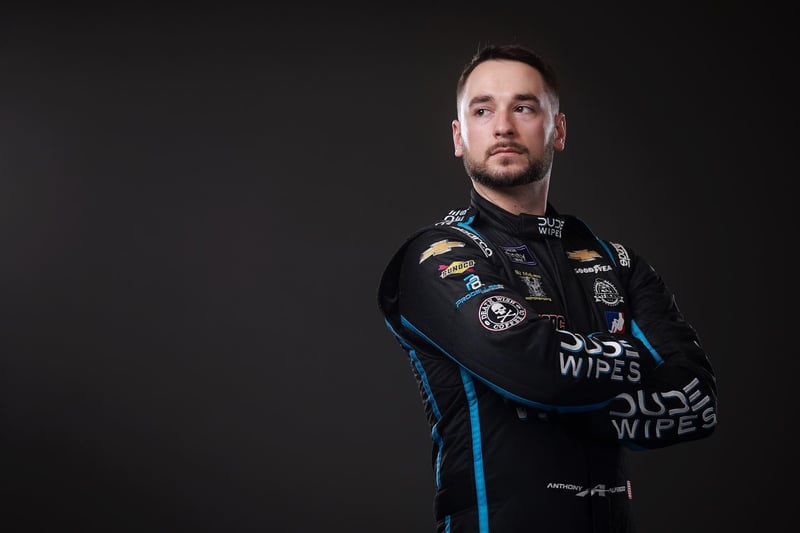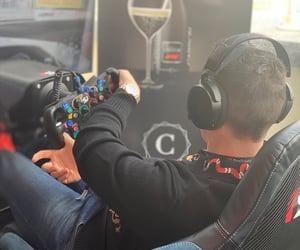Anthony Alfredo’s iRacing graphics settings
Even before he hits the virtual track, Anthony has spent years playing with every possible graphics setting in iRacing. As a pro, he knows that every detail counts—which is why he has the advanced graphics settings set for peak performance and realism!
One of the first settings that he tweaks is the maximum frame rate that he’ll allow the game to produce. Anthony recommends setting the maximum frame rate at just under what your monitor’s maximum is; for example, for him this means he sets it at 140 frames per second since his monitor’s maximum is 144 FPS. This will also depend on the capacity of your computer’s graphics card!
He also ensures to hide the arms and steering wheel in the game, since they don’t add anything new to his experience.
“I have my wheel here and my arms here, so I don’t need to see them duplicated on the actual screen,” he explained with a laugh.
Beyond the aesthetic settings, Anthony also uses this video to discuss how he fine-tunes all the racing graphics to make the experience as realistic as possible while also maintaining an exciting gameplay. Be sure to check it out in its entirety to learn the ins and outs of his settings and the accompanying reasoning!
How Anthony Alfredo conquers the Richmond Raceway
Though the Richmond Raceway is known for its oval and seemingly simple style, that doesn’t mean that it’s simple to drive and that it comes without strategy.
Early in his tips and tricks video for the Richmond Raceway—which happens to be his best track—Anthony highlights arguably one of the biggest challenges of a track like Richmond: the track surface gets rubbery from the tires extremely quickly, and this makes it difficult for drivers to get to the bottom yellow line—which is the most important thing to do if you want to conquer this track. To explain the issue in simple terms, think of it like how Anthony does: the longer the race goes on, the more the track becomes like the surface of a cheese grater. Some parts of the track will have traction while others will have none whatsoever!
He also explains the many reasons why it is beneficial to have a haptic sim racing rig while racing this track, since one of the main things that can be felt but not seen is the traction of his tires. Without the haptic feedback, he can miss out on precious seconds every lap—and he can run on worn-down tires for too long to come out on top.
After he walks you through other tips and tricks for Richmond Raceway, he also replays his race and does a lap-by-lap of breakdown of what he did right and what he did wrong, allowing you to perform the same analysis on your own race playbacks.
How Anthony Alfredo conquers Darlington Raceway
Known as the track that is “too tough to tame,” the final track that Anthony takes on in this particular tips and tricks video series is the infamous Darlington Raceway, which doubles as his favourite track to race!
Anthony opens this tutorial by walking you through the D-BOX installation process and shows you the motion settings that he uses to make the haptic feedback as realistic as possible. He then wastes no time hitting the track, highlighting the importance of exiting each curve low and straight!
In a track as difficult as Darlington, any opportunity to gain seconds back is one that must be seized and no one knows this better than Anthony. To stay ahead of his opponents, he always has a few tricks up his sleeve: he stays low where others drive high to get clean air, he makes sure that his tires don’t grip too much in the turns and he diamonds certain parts of the track.
Slowing down to properly demonstrate some of the more difficult aspects of Darlington, this video is a must-watch for anyone who dares race there—without it, you’ll have trouble lapping your opponents.
Race like Anthony; race like the pros
In the world of motorsport, precision and expertise make all the difference. With Anthony Alfredo’s guidance through his Tips and Tricks series, you’re now armed with a wealth of knowledge to fine-tune your racing experience!
As you take his valuable tips to the track, remember that practice makes perfect and with hard work and dedication, you can elevate your racing game to new heights!




